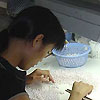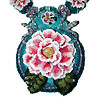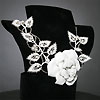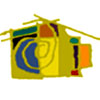June, 2008

From MyLovelyBeads.com TeamWe celebrate the first anniversary of our MyLovelyBeads.com newsletter! Read in this issue:
Pearl value factors
Contact us with any questions at
info@mylovelybeads.com.
MyLovelyBeads.com news Featured artist - Erin Simonetti 2008 Bead Dreams Exhibition Leather and beads Step by step - Mermaids Garden July upcoming events Best regards,
MyLovelyBeads.com Team |
Pearl value factorsEach pearl type (freshwater pearls, saltwater pearls, Akoya pearls, Biwa pearls, South Sea pearls, Tahiti pearls) has its own characteristics due to the specific forming condition, and the pearl grading factors are normally not considered equal. Knowing pearl types is the precondition of evaluating pearls. Each type of pearls has its own characteristics and valued standards. Among different types of pearls, saltwater pearls are more valuable than freshwater pearls. Natural pearls cost more than cultured pearls. Luster and Nacre Pearl luster is the brilliancy and the soul of pearls. This chief evaluating factor separates the inferior pearls from superior and the ordinary from the extraordinary. As a natural attribute, the luster of a pearl depends on the quality of the nacre - its transparency, smoothness and overall thickness as well as the thickness of each of the microscopic layers of nacre. A very thin nacre thickness would reduce pearl luster, color evenness and durability and could never make a fine quality pearl. Freshwater pearls have a very thick pearl nacre. Akoya pearls nacre are the thinnest among all types of pearls. Surface Surface imperfections are part of pearls natural texture and proof of the pearl genuineness. Even though a pearl is considered more valuable when the surface imperfections are minimal, people should positively consider them more than negative when evaluating pearls. People always desire perfect pearls without any flaws, but in fact, the longer a pearl is in an oyster, the more possible it grows to be irregular and get blemish. Color Pearls come in a wide variety of colors, ranging from white all the way to black. The natural color of pearls results from a combination of body color, overtone and iridescence. The wearer's preference determines what color is the best for him/her. Fashion trends and color demand affects different color pearl price. But it is still important to find a color that is rich and evenly distributed on the pearl. Shape Perfectly round pearls are rarest and most valued. Symmetrical pearls are more valuable than baroque. However, baroque pearls, with their various shapes, can inspire talented jewelers or artists and be created into some amazing arts. Size The larger the size, the higher the price. But price jumps between pearl sizes are often uneven. Large pearls are more difficult to cultivate because of the large size of the implanted nucleus. There is an increased likelihood that the oyster will reject the nucleus. Treatment Most of pearls we see are treated more or less. Pearl treatment is a must process before these beautiful gemstones are put on market. There are many methods to treat pearl including polish, bleaching, dyeing, filling, irradiation, coating and oiling. Treated pearl doesn't mean low quality. People use a exquisite craft to make pearls perfect. That is much more like that a diamond can be call a diamond only after it is cut according to the rock's characteristics. |
|
MyLovelyBeads.com news
This spring Zoya Gutina won 2008 Annual Jury for Torpedo Factory Artist and became a member of this well known in Washington Metropolitan Area (and not only) Artist Association. Since June she have shared vintage studio 5 at the Torpedo Factory Art Center with remarkable printmaker and artist Nancy Reinke. You can visit Zoya in the studio, talk to her, take a look at her jewelry, and buy a piece to spoil yourself or as a gift for your loved once. Here is the report about the first Zoya's day in the studio: First day in Studio 5. The studio address is: |
|
Featured artist
When Erin Simonetti (Howard County, Maryland, USA) was twelve years old, her Great Aunt made for her a wooden bead loom, much like was seen in Native American Publications. With some beads and string, she found herself beading, any and every chance she could get. Since there were no books readily available, as there are today, to give patterns and teach techniques, Erin had to devise ways to utilize all the little strips of beads she had loomed! Her idea of 3-D beading came to light! This then created another dilemma of deciding how to secure her creations, decrease and ascend rows to accomplish particular shapes. Erin also purchased a lot of graph paper to plan out her designs and color them accordingly. Erin Simonetti always enjoyed graphing large scenes and designs depicting flowers, birds and butterflies. Her first three dimensional necklace was completed early in these times, but today she has proven finer techniques. Erin's goal was always to use glass seed beads, 11/0, 15/0, 22/0 and smaller, create a realistic design, and mold them like clay to make wearable art. Some people have commented that her work looks like painted fabric and not beads! And if you have a look at Erin's work you will understand that they were right. Erin's college days found her a student at the Maryland Institute of Art, majoring in crafts. Again, there was no outlet, at that time, for beads, so she confined her interests to stained glass and painting. Later, hosting a stained glass class in the evenings for interested friends. Erin's husband and three children have been very supportive of her "constant beading". Introducing herself to the "beading and festival" communities had been a perfect way to meet others, also interested in creating art through the medium of beads. In this light, Erin has met many "bead lovers" who feel as passionate for beading as she does. Erin has shown her work, as a vendor, in many "jury selected" art shows, been published in magazines and books. Through all her life, Erin Simonetti has continued to perfect her "mind's eye" of beading.
Gallery on MyLovelyBeads.com
|
|
2008 Bead Dreams Exhibition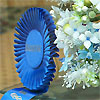
The annual Bead & Button Show is one of the most popular bead show in the world. Thousands of people from more than 30 countries came this year to the Midwest Airlines Center in Milwaukee, Wisconsin. It was a full week of beading, jewelry making, shopping, and talking about beads ( pictures ). There were two exciting displays this year. One was the Japanese Arts J Crafts Exhibition 2008 of the award-winning pieces from the beadwork and jewelry contest held in the Hakone Open-Air Museum, and another one was the Out of the Box Exhibition of glass beads ( pictures ). But the main event of course was the exhibition, where works of all 2008 Bead Dreams contest finalists were on display in the show's lobby area. The winners in six categories received award ribbons: blue for the 1st place, red for the 2nd place and white for the 3rd place. At the end of the Show the main awards winners were announced:
•
Best-In-Show • Runner-Up Best-In-Show - Hiroko Toda for the necklace "Sakura" • People's Choice Award - Nobuyo Chiba for the "Beaded Chess" |
|
Leather and beads
As summer arrives, we have a new featured artist. Anna Mikhaleva is unique in her work with both leather and beads, which is her favorite type of design to work on. She also does beautiful work with beads and gemstones. Her inspiration often comes from gazing at the night sky which makes her believe in wonders. This inspiration is brought out in her black & white and dark/light two color combinations. Anna lives in the Urals, in a small city of Miass with her beautiful teenaged son and daughter. Her beginning in jewelry design and beadwork came when she once went into a bookstore to buy a new book by Brazilian Paolo Koelio (Paulo Coelho), but instead she bought a perfectly illustrated book of Russian beadwork guru, L.Bozhko. From then on, she added beadwork to her list of hobbies, that also includes graphics, reading (fantasy, classical, historical) and listening to music (jazz, ethnic, classical). This hobby has grown into the creation of lovely beadwork that we are honored to share with you.
Anna's work can be seen at her gallery: leather and beads jewelry. Another Anna's small gallery: gemstone beaded jewelry. Contact Anna at anna041620@yahoo.com. |
|
Step by stepWe hope that it was interesting for you to look at the pictures depicting the process of designing and making the Butterfly Handbag by Guzell Bakeeva; we gave them in our previous issue. Today we continue this topic, another project process pictures are about Mermaids Garden Necklace by Zoya Gutina. That amazing necklace won First Place in glass category in the Rings & Things "Your Designs Rock!" 2008 Jewelry Design Contest. |
|
Upcoming events
July 16-19, 2008 This event is the granddaddy of all the other successful art festivals in the country. It is now four official fairs but it all began in 1959 on South University, the original Street Fair. Its' success, proving that artists could find a new marketplace, has since spawned three more concurrent festivals. The four shows are a confederation, sharing city services and keeping the same dates and hours. Over 1200 exhibitors show up ready to meet you. Ann Arbor turns into Art Fair City every July for four days. They include:
• Ann Arbor Street Fair
• State Street Area Art Fair • Summer Art Fair • Ann Arbor's South University Art Fair |
© 2010 MyLovelyBeads.com All Rights Reserved.
If you do not want receive our newsletter and you wish to remove your email address from our mailing list, please click the following link to unsubscribe.



